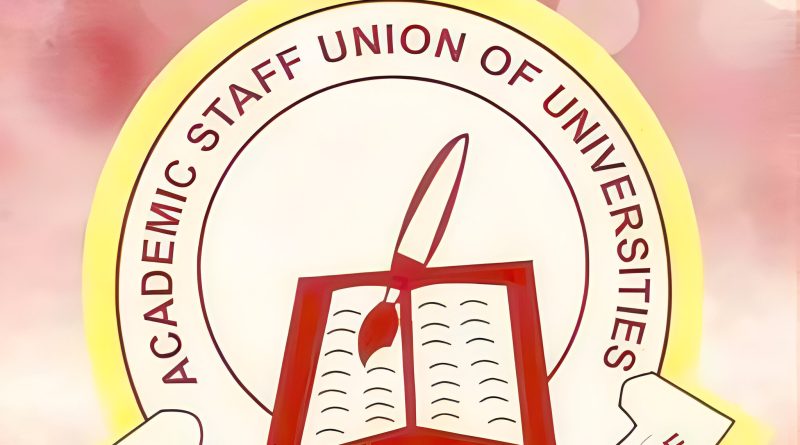ASUU to begin two-week strike on Monday
Nigeria’s largest academic staff union, ASUU, has directed its members to embark on a comprehensive strike from Monday, following the expiration of a two-week ultimatum issued to the federal government.
The president of the union, Chris Piwuna, a professor, announced the strike during a press briefing at the University of Abuja on Sunday.
Two weeks ago, the union issued a final ultimatum to the government after its chapters and the National Executive Council (NEC) decided in favour of a strike.
A week into the ultimatum, ASUU said the government had yet to take meaningful steps to halt the planned strike.
“It is regrettable to note that nothing significant has happened to change the position of NEC since we last briefed the Press.
“Consequently, all branches of ASUU are hereby directed to withdraw their services with effect from midnight on Monday, 13 October 2025,” Mr Piwuna said on Sunday.
He said the warning strike would last for two weeks.
He explained that the warning strike shall be total and comprehensive, adding that there is nothing sufficient to stop implementation of the ASUU-NEC’s resolution to embark on the two-week warning strike.
This is ASUU’s first nationwide strike since 2022, and the first since President Bola Tinubu assumed office.
In 2022, ASUU downed tools for eight months –from February to October 2022, until an industrial court ordered it to suspend the strike, after the then Minister of Labour, Chris Ngige, filed a lawsuit against the union.
The Minister of Education, Tunji Alausa, had said Mr Tinubu had directed the ministry to ensure that ASUU never embarked on a strike.
A deadlocked negotiation
In August, Mr Alausa set up a committee headed by the ministry’s permanent secretary, Abel Enitan, to look into the submitted draft agreement between ASUU and the Yayale Ahmed-led committee. The committee, inaugurated in October 2024, submitted its report to the government in February.
On Tuesday, the education minister reconstituted and inaugurated another committee to ‘accelerate ongoing discussions’ with ASUU and other unions in the tertiary institutions.
The new committee, Federal Government Tertiary Institutions Expanded Negotiation Committee, is to be headed by Mr Ahmed, the pro-chancellor of Ahmadu Bello University, Zaria.
However, Mr Piwuna explained that an ‘emergency meeting’ held with the committee on Friday, 10 October, was “nothing to write home about”.
He said the presentation to the ASUU team at the meeting was a total departure from the letter and spirit of the “Review of the Draft 2022 Agreement” submitted by the Yayale Ahmed committee.
“To say the least, the documents were neither here nor there,” he said.
Many committees, same result
This new committee is at least the sixth committee inaugurated by the government to renegotiate the 2009 agreements with university-based unions. Each time, the government has failed to implement the draft produced by the committees and instead creates yet another committee.
The 2009 agreement has been the source of dispute between the government and university-based unions. The agreement contains the academics’ conditions of service, funding and autonomy for the universities.
The renegotiation of the 2009 agreement, which was meant to be every few years, has stalled for close to a decade.
Before this new committee, Mr Ahmed headed the renegotiation committee inaugurated by the government in October 2024.
Before Mr Ahmed, the late Nimi Briggs, an emeritus professor, led the renegotiation committee in 2022 and produced a draft that the government never signed or implemented.
Before Mr Briggs, it was Munzali Jibrin’s committee of 2021, which also produced a draft that was never signed.
Before both of them was Wale Babalakin, who headed the committee from 2017 to 2020 when he resigned.
14 years, same demands
Mr Piwuna listed the issues of contention between ASUU and the federal government to include the conclusion of the renegotiated 2009 FGN-ASUU Agreement, release of the withheld three-and-a-half months salaries, sustainable funding of public universities, and the revitalisation of universities.
Others are payment of the outstanding 25-35 per cent salary arrears, payment of promotion arrears for over four years, and the release of withheld cooperative contributions deductions.
The 2009 agreement is the crux of ASUU’s dispute with the Nigerian government, which has lasted over a decade.
The agreement, first signed in 2009, covers Nigerian academics’ conditions of service and salary structure, which ASUU complained had remained the same to date.
READ ALSO: ASUU: Nigerian govt inaugurates yet another committee to negotiate with unions
The agreement also included a clause that the Nigerian government would spend N1.2 trillion in five tranches of N200 billion annually on the universities from 2009 to 2015. Only N200 billion has so far been released.
It also included autonomy for the universities, which ASUU argues is being eroded with the introduction of a centralised payment platform of the Integrated Personnel Payroll Information System (IPPIS).
The agreement also includes a provision for renegotiation every four years. That renegotiation has not been successfully completed since the first agreement was signed.

